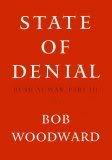State of Denial by Bob Woodward, Simon & Schuster (September 30, 2006), 576 pages
Rumsfeld is a dick
Won’t flow the forces we need
We will be too light
This was a haiku written by Steve Rotkoff, a senior military intelligence officer with 25 years in the Army very early after he was drafted for the Iraq war planning. Rotkoff was not alone with such assessment about the Defense Secretary. When asked about Rumsfeld, Chairman of the Joint Chief of Staff, Richard B. Meyers put both his hands on a small table and laid his head on it to express his frustration. At one point Rumsfeld stopped talking to National Security Advisor Condi Rice that the President has to step in.
Bob Woodward’s third book in the Bush at War series talks about the arrogance of Rumsfeld, clueless nature of the the folks who managed the war and ends with the constant denial of facts by the President and Vice-President. The book was written based on interviews with Bush’s national security team, key players in the administration responsible for military, diplomacy and intelligence. He talked to people in Defense, State and CIA including the Secretary of Defense, Rumsfeld.
One thing I have always wondered is how the reaction against Sept 11 attacks transformed into a war against Iraq and who was responsible for it. Once again it turns out to be Rumsfeld. The day after the attacks, it was Rumsfeld who asked Bush on why they shouldn’t go against Iraq as well. Rumsfeld was one person who thought that George H.W. Bush had screwed up badly by not going against Saddam in 1991. Initially George W. Bush puts him off, but later decides to go with the plan, 71 days after the 9/11 attacks.
A think tank consisting of Bernard Lewis, Mark Palmer, Fareed Zakaria, Fouad Ajami and the likes were gathered secretly and they analyzed the middle east problem and concluded that a confrontation with Saddam was inevitable. The question then was on what pretext would the war be started and WMD looked like a natural choice. The top intelligence officer for the invading forces, James “Spider” Marks was given a list of 946 sites where intelligence had indicated there were production plants or storage facilities.
The only problem was that the list was outdated. David Kay, who went to Iraq as the inspector after the first Gulf war was sent this time as well and he found that there was no new information on this. Still this did not prevent the President and Vice-President from repeating again and again about the WMD threats to America and its allies. The search teams did not find any WMD and in one instance the “Scooter” Libby calls David Kay in Baghdad and gives him the co-ordinates to search.
Besides talking to a large number of people, Woodward has also reviewed secret documents and secure communication between the leadership in Washington and Baghdad. After analyzing all this information the book is written in such a way that it is a page turner and you get to know a lot about the personality clashes that happened.
George Tenet at the CIA was against the White House. Rumsfeld was against Jay Garner. Condi Rice could not stand Rumsfeld. Then there is a president who doesn’t want to know any details and keeps on repeating that we will prevail. As you read those chapters, you are shocked to see the callousness with which this war was done.
When Jay Garner was replaced with Paul Bremmer and one of the first things he performed was de-Baathification. When he was dissolving the Ministry of Interior, Bremmer did not know that Police reported to ministry. Once that happened, the number of insurgent attacks increased exponentially. Then in a scene which seems inspired from Wag the Dog, President Bush asks Secretary Rice if they should approach Hollywood to prepare a propaganda campaign.
The number of people who grew frustrated with Rumsfeld were not just Condi Rice or the Generals. By Spring 2004, Paul Wolfowitz was frustrated as he had been trying to get Rumsfeld to take on the training of Iraqi security forces and Rumsfeld was resisting it strongly. Even Laura Bush tells that she thought Rumsfeld was hurting the President.
There are some funny moments when Woodward reveals some secret conversation. After David Kay testifies before Congress blaming the NSC and Rice for the intelligence lapses, he gets a call from Robert Joseph, an NSC Staffer. “This conversation never took place”, Joseph says when he meets Kay, but the whole thing is there in the book.
Reading the book you get the feel that two people could have stopped the war. One of them was Colin Powell, who was at his peak of influence when the war started. According to Senator Carl Levin of Michigan Powell could have told the President that this the wrong course. The other person was President George H.W.Bush. He and Barbara Bush knew this was wrong, but did not influence the President because they thought that it was not ethical and W should make his own decisions.
The last line reads, “With all Bush’s upbeat talk and optimism, he had not told the American public the truth about what Iraq had become”. Even though everything was going wrong in Iraq, the President and Vice-President and Rumsfeld were in denial. The final chapter of the book is an eye opener when Rumsfeld claims that he is not directly responsible for the deaths in Iraq though he was a micromanager of this war. President Bush was not even willing to acknowledge the fact that no WMD was found.
This scathing critique of Bush and Co. is a must read.
